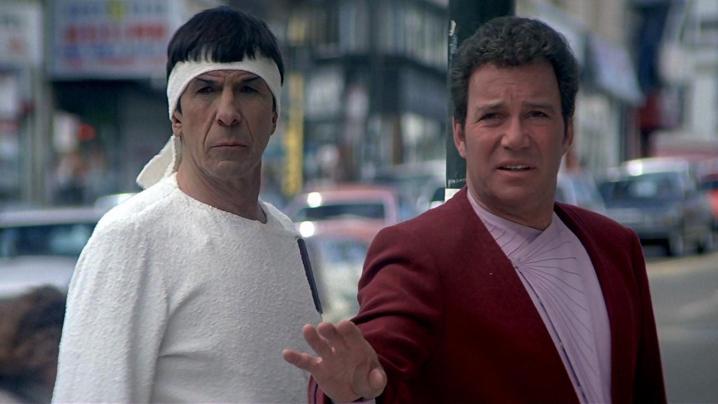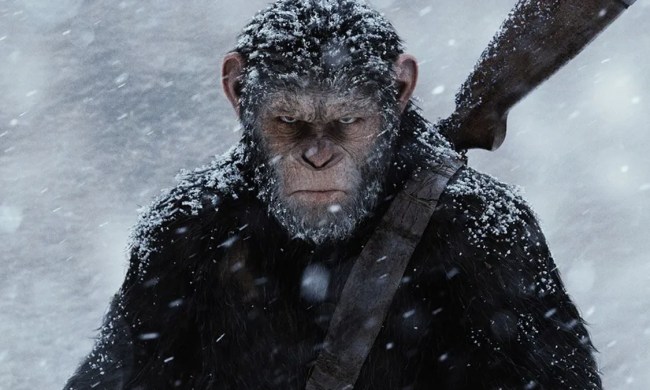Star Trek is inarguably television’s greatest space adventure, captivating audiences with exciting, inspiring, and thoughtful stories since 1966. However, like most culturally significant pop culture franchises, Trek also has a long history on the big screen, supplementing its over 800 television episodes with 13 feature films. These large-scale adventures are often the gateways through which new fans find their way into the Star Trek universe, attracting mass audiences on a scale rarely enjoyed by their counterparts on TV.
- 13. Star Trek: Nemesis (2002)
- 12. Star Trek V: The Final Frontier (1989)
- 11. Star Trek Into Darkness (2013)
- 10. Star Trek: Insurrection (1998)
- 9. Star Trek III: The Search for Spock (1984)
- 8. Star Trek: The Motion Picture (1979)
- 7. Star Trek: Generations (1994)
- 6. Star Trek Beyond (2016)
- 5. Star Trek IV: The Voyage Home (1986)
- 4. Star Trek: First Contact (1996)
- 3. Star Trek (2009)
- 2. Star Trek VI: The Undiscovered Country (1991)
- Honorable Mention: Galaxy Quest (1999)
- 1. Star Trek II: The Wrath of Khan (1982)
However, as one might expect from a long-running film series that has had multiple casts and behind-the-scenes shake-ups, the Star Trek movies vary wildly in quality. The conventional wisdom amongst fans is that even-numbered Trek movies are much better than odd-numbered ones, an adage that still holds up if you slot in the loving parody Galaxy Quest as the unofficial tenth installment, which, of course, we do.
13. Star Trek: Nemesis (2002)

“A Generation’s Final Journey Begins,” boasted the theatrical poster for Star Trek: Nemesis, the fourth feature film to include the cast of the hit series Star Trek: The Next Generation. It’s also where their final journey ended, at least on the big screen. Nemesis failed to satisfy critics, casual filmgoers, or Trek devotees, opening at No. 2 at the US box office behind J.Lo vehicle Maid in Manhattan and plummeting the following weekend thanks to the debut of The Lord of the Rings: The Two Towers.
Helmed by an allegedly indifferent director in Stuart Baird and edited to within an inch of its life by producer Rick Berman, Nemesis is a dreary, lifeless slog with none of Trek’s usual heart. There are a few highlights, such as the young Tom Hardy’s performance as Captain Picard’s villainous clone and the light-hearted fun of Riker and Troi’s wedding, but for the most part, Nemesis is just a bummer. It’s no wonder why, decades later, the streaming series Star Trek: Picard would spend its first season trying to rehabilitate it, and its third season outright replacing it as a farewell to the cast of The Next Generation.
12. Star Trek V: The Final Frontier (1989)

During the original run of Star Trek in the 1960s, lead actors William Shatner and Leonard Nimoy had a “favored nations clause” incorporated into their contracts, stating that each actor was entitled to any raise in pay or perks received by the other. This clause remained intact during the franchise’s big screen revival in the late ‘70s and ‘80s, so when Nimoy won the job of directing the third and fourth Star Trek films, Paramount couldn’t refuse Shatner the same privilege. The result was a troubled production and a critical disaster, and if not for Star Trek: The Next Generation finding its footing on television that very same year, it could well have damaged the franchise beyond repair.
The blame doesn’t all fall on Shatner’s shoulders; The Final Frontier faced a number of obstacles, such as a writer’s strike and an unqualified special effects team. Its story is ambitious, sending the Enterprise crew on a mission to the center of the galaxy to meet a being who claims to be God Himself, and there are some truly charming moments of camaraderie between Kirk, Spock, and McCoy. For the most part, however, The Final Frontier is a mess, teetering precariously between “so bad it’s good” and just plain bad.
11. Star Trek Into Darkness (2013)

2009’s Star Trek reimagined the brainy space procedural as a shiny, fast-paced action adventure, grabbing mainstream attention on an unprecedented scale. The Next Generation and its spin-offs were well-regarded, but now, suddenly, Star Trek was … cool? Consequently, its sequel was granted a colossal $190 million production budget and preceded by a great deal of hype.
Upon its release, Star Trek Into Darkness couldn’t quite live up to either. It fell short of its predecessor at the box office and flummoxed fans and critics with a contrived, overblown story that retreads the beloved Star Trek II: The Wrath of Khan while also stealthily promoting the 9/11 truther movement. It’s a thematically muddled “dark middle chapter” to a trilogy that, thanks to co-writer Roberto Orci’s subsequent departure from the franchise, was jettisoned in favor of Justin Lin’s Star Trek Beyond. And, honestly, we’re better off without it.
10. Star Trek: Insurrection (1998)

Do you ever hear a cinephile refer to a real film that, as far as they’re concerned, “doesn’t exist?” We’re not talking about movies that are loathed and willfully forgotten, like Norbit or The Last Airbender, we mean films that were so promptly forgotten that they provoke no feeling whatsoever even from those who saw them, like Transcendence or The Huntsman: Winter’s War. If not for its place in one of pop culture’s most recognizable franchises, Star Trek: Insurrection would surely fall into this category.
The third film starring the Next Generation cast feels like a very expensive two-part episode of the television series, but not a particularly good one. Its dilemma, which sees Picard fighting to keep Starfleet from exploiting a cosmic fountain of youth, is theoretically compelling but poorly thought out. Most of the highlighted character moments come in the form of funneled-in comic relief, and its attempt to recast this gang of affable middle-aged nerds as rebellious action heroes simply doesn’t work. Like all Star Trek products, it has its loyal defenders, but were it not for its place in the franchise’s canon, we doubt anyone would give it a second thought.
9. Star Trek III: The Search for Spock (1984)

Star Trek II: The Wrath of Khan was an instant classic that dug more deeply into the original show’s beloved characters than ever before, expanded the canvas of their lives, and delivered a powerful, emotional ending. So, it’s stunning that its immediate follow-up, The Search for Spock, willfully undermines it at nearly every turn. The Wrath of Khan’s iconic, tear-jerking death scene is undone; the feeling of hope and rejuvenation implied by its ending is evaporated in the sequel’s very first scene; its three new characters are killed off, recast, and totally absent, respectively.
Despite this, The Search for Spock isn’t actually retrograde, in fact, it’s a surprising lateral move for the characters, who have always been driven by their duty to Starfleet, to put their lives and careers on the line for an unsanctioned mission to rescue their lost friend from a forbidden planet. The concept is exciting and there are warm and wonderful moments of character throughout, but the execution by TV-minded writer/producer Harve Bennett and first-time feature director Leonard Nimoy feels a bit small and underwhelming.
8. Star Trek: The Motion Picture (1979)

If The Search for Spock is an ambitious story with an underwhelming production, then The Motion Picture is the reverse case. Academy Award-winning director Robert Wise took a screenplay adapted from what was meant to be the pilot to a new Star Trek TV series and, with the aid of an astronomical budget, tried to make it into his own 2001: A Space Odyssey.
The result is a film in which characters silently gawk at the crazy light show they’re seeing out the Enterprise’s viewscreen for minutes at a time. Plot isn’t everything, but when a movie is 132 minutes long but only really has enough story for 90, that laser light show had better be damned compelling. And, heck, it is pretty spectacular, especially if you have the privilege of seeing it on the big screen, but the runtime is so bloated that its character beats, including one of Leonard Nimoy’s best performances as Spock, get totally lost. Even in its more polished “Director’s Edition” form, The Motion Picture is Star Trek at its slowest and most sterile. However, if you’re in the mood for something trippy and meditative, it’s still worth a watch.
7. Star Trek: Generations (1994)

Whereas the classic Star Trek gained an obsessive fanbase in the decade following its cancelation, Star Trek: The Next Generation was a legitimate phenomenon in its own time, outshining the original series in terms of both commercial and critical success. With the original cast growing more expensive and less profitable on the big screen, it was practically a given that the Next Gen crew, led by Patrick Stewart, would eventually take their place in the Star Trek film series. Star Trek: Generations, whose production overlapped with that of TNG’s series finale, sees Kirk passing the torch to Picard in a crossover adventure that fans had been imagining for seven years.
Since there was probably no way for the film to meet the audience’s expectations for a Kirk/Picard team-up story, writers Ronald D. Moore and Brannon Braga attempted to subvert them all together and deliver a more personal story about death, loss, and legacy. Audiences found the long-awaited crossover underwhelming at the time but taken on its own merits and judged more as a Next Generation episode than as a blockbuster event, Star Trek: Generations is actually one of the more interesting films in the franchise, and the only one that allows star Patrick Stewart to exercise the full extent of his acting range.
6. Star Trek Beyond (2016)

When the first teaser trailer for Star Trek Beyond premiered online, die-hard Trekkies went into full panic mode. “It’s bad enough that Paramount hired the Fast & Furious guy to make Star Trek,” the nerds cried, “but now they’ve got Captain Kirk riding a dirt bike? Star Trek is ruined forever!” It surely was not, in fact, we’d argue that Justin Lin’s Star Trek Beyond does a better job capturing the sense of fun, friendship, and wonder of the original Star Trek than any other feature film, save for the next entry on our list. At the same time, it also steps out of the shadow of the franchise’s dense mythology after J.J. Abrams’ two nostalgia-driven adventures.
With no legacy cast or famous villains in their way, Chris Pine, Zachary Quinto, Zoe Saldaña, and company finally get to have their own Star Trek, one in which all of their iterations on the Enterprise family feel like fully formed adults without sacrificing the youthful vigor that attracted new fans to the rebooted Trek films in the first place. It’s delightful, both as its own film and as an accidental bookend to the Kelvinverse Trilogy.
5. Star Trek IV: The Voyage Home (1986)

Star Trek is often serious business, an arena for complex characters to confront difficult ethical dilemmas that help audiences to confront the adversity and inequity they encounter in real life. But, it’s important to remember that Star Trek can also be very silly and that many of its most memorable moments are born from its dalliances in farce. The Voyage Home is a wry fish-out-of-water comedy in which the crew of the Enterprise (who, following The Search for Spock, are now fugitives from Starfleet) travels back in time to 1980s San Francisco in order to kidnap a pair of humpback whales in the hope that one of them might be able to talk a powerful space probe in the 2280s out of destroying the Earth.
The story has blockbuster-level stakes, but they all but disappear for a solid hour of the film in favor of a charming light adventure that prioritizes Trek’s memorable cast over flashy effects or high drama. Thanks to a clever script and terrific comedic chemistry between William Shatner, Leonard Nimoy (who also directs) and guest star Catherine Hicks, The Voyage Home is a total crowd-pleaser and was even the franchise’s biggest box office hit before the 2009 relaunch.
4. Star Trek: First Contact (1996)

1996 could be considered the apex of Star Trek’s cultural relevance. The franchise was celebrating its 30th anniversary, both Deep Space Nine and Voyager were on television every week, and there was an absolute deluge of books, PC games, and other merchandise available. The cherry on top was Star Trek: First Contact, the second film to feature the cast of The Next Generation and the only one to catch fire with general audiences.
A dark action-thriller that has as much in common with Aliens as it does with The Wrath of Khan, First Contact pits Captain Picard and the crew of the new Enterprise against their most famous enemy from their television hay day: the Borg. At the same time, First Contact serves as a sort of origin story for Star Trek itself, as its time travel plot takes our characters to an event in our future that is pivotal to their history. It’s a terrific “gateway Trek,” an approachable popcorn flick that explains the franchise’s values and aspirations for a better future within the context of a relatively dark and creepy action movie.
3. Star Trek (2009)

Though rejected by Trek traditionalists for its mile-a-minute pace and cranked-to-eleven characterizations of young Kirk, Spock, and the rest of the classic Enterprise crew, J.J. Abrams’ 2009 Star Trek reboot was a massive popular success that breathed new life into a franchise that had completely run out of gas by the early 2000s. Not everyone may be a fan of just how far it pushed Trek into the realm of “big dumb action blockbuster,” but the truth is that, after 18 continuous years under the same creative management, Trek desperately needed a refresh.
Abrams and writers Roberto Orci and Alex Kurtzman (the latter of whom remains at the helm of the franchise to this day) radically changed the visual aesthetic and the tempo of Star Trek from classical to classic rock, and in so doing restored an element that had long been lacking in the film series: Joy. Emotionally intense and startlingly sincere, Star Trek more than earns its place near the top of our list of Trek’s best theatrical outings.
2. Star Trek VI: The Undiscovered Country (1991)

Being an episodic drama from the 1960s that got canceled during its third season, the original Star Trek never really got a “series finale.” As was commonplace in television at the time, when Star Trek ended, it just stopped. Thanks to its revival on the big screen, Trek got a new lease on life, a grand legacy, and — 25 years after it first appeared on television —a proper ending. The Undiscovered Country reunites the entire classic cast one last time, along with writer-director Nicholas Meyer, the man behind the No. 1 entry on our list, to tell the tale of the final voyage of Kirk’s Enterprise, one that provides closure to the crew’s growth over the course of the five preceding films.
In proper Trek tradition, it’s also an incisive political allegory about the end of the Cold War (one of The Original Series’ most common subjects) and the difficulty of putting aside old prejudices and embracing change. The Undiscovered Country doesn’t paint our Starfleet heroes in the most flattering light, which provoked the ire of Star Trek creator Gene Roddenberry, but that’s the entire point: to see characters who we’ve grown up with confront their own learned hatreds so that those who come after them can live in a better world.
Honorable Mention: Galaxy Quest (1999)

While not technically not a Star Trek movie, Galaxy Quest is a loving parody that captures the essence of classic Trek as well as any film in the canon. The story of a band of washed-up actors who are abducted by aliens who believe them to be the gallant space travelers they played on TV, Galaxy Quest skewers sci-fi fandom and tropes while also telling a heartfelt story about friendship, compassion, and imagination. I
t’s no wonder that this film has been adopted by Trekkies as an unofficial yet essential part of the Star Trek movie canon. Should you choose to include it, slot it right here on our rankings, beneath…
1. Star Trek II: The Wrath of Khan (1982)

The phrase “ad astra, per aspera” meaning “to the stars through hardships,” has been adopted by many a starry-eyed enterprise (including Starfleet itself), but it also applies perfectly to the production of Star Trek II. Produced with a third of its predecessor’s budget by an inexperienced director who had only twelve days to rewrite its script, The Wrath of Khan could very well have been a disaster. Instead, it’s almost universally considered to be the best Star Trek film and one of the most enduring science fiction films of all time.
Functioning as a sequel to the classic episode Space Seed, Khan pits William Shatner against a worthy, equally hammy foil in Ricardo Montalbán, and their tête-à-tête is pure movie magic. The submarine-style battle at the film’s climax is one of the franchise’s strongest action sequences, but it’s Admiral Kirk’s inner journey that gives The Wrath of Khan its soul, as he confronts the cost of a life spent cheating death and hopping galaxies. Star Trek is not always literature, but The Wrath of Khan is a genuine work of art, a treat not just for Trekkies or genre fans, but for all lovers of cinema.



